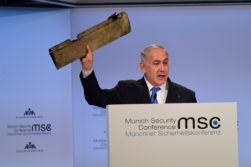
This isn’t the first time Iranian drones and Israel have clashed. Prime Minister Benjamin Netanyahu holds up piece of Iranian UAV in February. Illustrative. Photo courtesy of Amos Ben Gershom GPO
Israeli forces foiled an Iranian plot to attack Israel with “killer drones” by targeting forces affiliated with Iranian special ops inside Syria on Saturday, as Israeli Prime Minister Benjamin Netanyahu made it clear on Saturday night that Iran “has no immunity anywhere.” On Sunday, the Hezbollah terror group warned of attacks of their own.
The IDF Twitter page said that Israel had “prevented a pending, large-scale attack of multiple killer drones on Israel by striking Iranian Quds Force operatives and Shiite Militia targets in Syria.” Netanyahu, in separate comments released by his office on Sunday, said the drones were “explosive-laden” and planned to “kill Israelis on the Golan Heights.”
Netanyahu called the Israeli action a “complicated operation” and a “daring decision” that “prevented serious attacks.” He warned not only Iran, but any country hosting Iranian forces, not to strike Israel. “I would like to emphasize: This was an initiative of Iran, under the command of Iran, at the behest of Iran.
“…I would like to stress that we will not tolerate aggression against Israel from any country in the region. Any country that allows its territory to be used for aggression against Israel will face the consequences, and I repeat: The country will face the consequences.”
The Syrian Observatory for Human Rights, a human rights group tracking the broader conflict in Syria, reported on their website that Israeli warplanes struck near the town of Aqraba, killing two members of Hezbollah and one person thought to be affiliated with Iran.
In addition, The Times of Israel reported that one unmanned aerial vehicle (UAV) exploded and damaged a Hezbollah office building in Lebanon, while a second one crashed in the area. However, while Hezbollah said they were Israeli drones, Israeli analysts cited in The Times of Israel report believed they were Iranian, based on photos released of the aircraft.
One Israeli expert included in the article, Retired General and head of The Institute for National Security Studies (INSS), Amos Yadlin, posted a series of Tweets in which he asked, “Were Iranian drones prevented from taking off from the Beirut area? ?? The strategy of the two sides appears to be ‘cooling’ the situation down to avoid full scale conflict.”
However, a follow-up tweet from Yadlin noted that Hezbollah leader Sayyed Hasan Nasrallah “is an Iranian proxy” and could be used to “settle the score” with Israel.
To that end, Nasrallah threatened Israel with revenge, accusing Israel of attacking with drones in Lebanon in addition to killing Hezbollah fighters in Syria. A report from Lebanon’s Al Manar quoted Nasrallah as saying that Israel’s ability to safely attack targets in Lebanon “has ended.” He warned Israel to await Hezbollah’s counterstrike “which may take place at any time on the borders and beyond the borders.”
Netanyahu, meanwhile, made it clear that Israel was pre-empting an attack by Iran.
“Our forces operate in every sector against the Iranian aggression. ‘If someone rises up to kill you, kill him first,’” said Netanyahu in the comments released by his office on Saturday night. “I have directed that our forces be prepared for any scenario. We will continue to take determined and responsible action against Iran and its proxies for the security of Israel.”
United States Secretary of State Mike Pompeo spoke with Netanyahu following the attack, posting to Twitter that he “expressed my support for Israel’s right to defend itself from threats posed by the Iranian Revolutionary Guard Corps & to take action to prevent imminent attacks against Israeli assets.”
Pompeo said in a follow-up post that he and Netanyahu “discussed how #Iran is leveraging its foothold in Syria to threaten Israel and its neighbors. The Prime Minister @netanyahu noted that Israel would strike IRGC targets threatening Israel, wherever they are located.”
The Israeli leader certainly wasn’t hiding that approach. In his comments on Sunday, Netanyahu said, “Henceforth we will expose any attempt by Iran to attack us and any Iranian effort to hide behind this or that excuse.”
The IDF Twitter page made good on that promise, posting video of “Iranian Quds Force operatives in Syria carrying a killer drone.” A post from IDF spokesman Brig. Gen. Ronen Manelis, as translated by Google from Hebrew, pointed to the Iranian special operations “Quds Force” led by Qasem Soleimani as heading the drone plot. The tweet said the incident demonstrates “the fact that the Syrian regime allows Iranians to operate freely from Syria.”
This isn’t the first time an Iranian drone incident has erupted in the Syrian-Israeli theater. Earlier this year, an Iranian drone entered Israeli airspace and was shot down by Israel, leading to open and direct confrontation between Iranian forces in Syria and Israel. While Israel once was hesitant to openly comment on operations against Iran in foreign locations, their taking of responsibility may help prevent further conflict, according to expert Yadlin.
In his series of Twitter posts, Yadlin noted that one reason Israel announced their latest actions in Syria is to “signal as warning to the enemy to avoid further escalation.”
(By Joshua Spurlock, www.themideastupdate.com, August 25, 2019)
